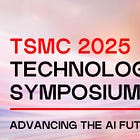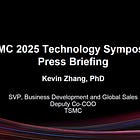2025 TSMC North America Technology Symposium_Topics Discussion_Part2
Original Articles by SemiVision Research (Dr. Kevin Zhang/Dr. Yuh-Jier Mii/Dr. Cliff Hou)
2025 TSMC North America Technology Forum Key Highlights
At the 2025 TSMC North America Technology Forum, the discussions delved into deeper technical topics, including Logic Device Yield Improvement and the introduction of the critical D₀ (Defect Density) metric. Dr. Cliff Hou, TSMC’s Senior Vice President of Design and Technology Platform, also presented TSMC’s future site expansion plans globally and addressed key topics surrounding supply chain resilience, green manufacturing, and carbon emissions, emphasizing the company’s commitment to sustainability goals.
On the technology front, the forum focused on several major application domains, including Radio Frequency (RF) technologies, Automotive semiconductors, Augmented Reality (AR), and Robotics, exploring the evolving technical demands driven by emerging applications. Additionally, TSMC provided updated insights into the CoWoS-L (Chip-on-Wafer-on-Substrate with Local Silicon Interconnect) advanced packaging technology, highlighting its critical role in supporting future HPC and AI workloads.
SemiVision Research will further analyze and discuss the key technology directions and industry trends revealed at this forum, continuing to track TSMC’s pivotal position within the global semiconductor ecosystem.
At this year’s North America Technology Symposium, a wide range of topics were explored.
SemiVision Research has already provided an overview in Part 1, explaining the current trends in TSMC’s technology development and the PPA (Power, Performance, Area) evolution of logic processes.
In this section, we will primarily focus on the challenges encountered in logic process development, including defect issues, aspects of green manufacturing, and the increasing complexity of advanced packaging technologies.
TSMC also conducted dedicated sessions addressing these areas.
Moving forward, we will provide in-depth discussions on the individual presentations given by Dr. Kevin Zhang, Dr. Yuh-Jier Mii, and Dr. Cliff Hou.
The slide materials prepared for these discussions comprise over 100 pages.










